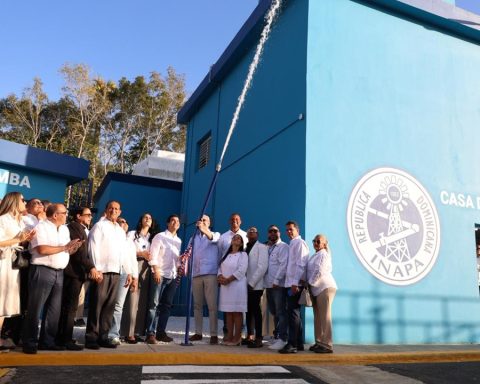August 14, 2024, 10:41 PM
August 14, 2024, 10:41 PM
The openness to dialogue that the Government has shown with the private sector in recent days has been applauded, but also booed. On Wednesday morning, the Government launched three decrees for the import of flour and wheat with zero tariff; import of equipment with zero tariff for biodiesel plants, and the regulation of mobile applications for passenger transport.
However, just hours before the launch of these decrees, on Tuesday evening, the Government’s “social cabinet”, social movements, proposed a control of the foreign exchange of exports “to guarantee the circulation of the dollar”; that there are incentives regarding the Financial Transaction Tax (ITF), and that profiteering and speculation are controlled.
The proposal was vehemently rejected by almost all economic actors in the countrymost of them while on their way to La Paz, to the “National Dialogue on the Economy and Production” with President Arce.
Economists and representatives of productive sectors of the country, observed that the decrees approved on Wednesday, seek to exert a Greater control over production in key sectors such as food productioncurrently affected by drought, diesel and dollar shortages.
The Cochabamba businessman and former president of the Federation of Business Entities of Cochabamba, Luis Laredo, considered “interesting”, the measures, especially the import of flour and wheat, since it will avoid shortages of the main input for making bread, fundamental element in the basic basket of Bolivians.
“But, the topic that Emapa or Insumos Bolivia have to distribute or have to sell, Obviously, this already generates a certain susceptibility in terms of prices and distribution,” he said in relation to the announcement by the Minister of Productive Development, Néstor Huanca, who indicated that the Government, through Insumos Bolivia, will import 60 thousand tons of wheat for the Food Production Support Company (Emapa).
Regarding the incentive to import equipment to produce biodiesel, Laredo considered that YPFB should not be the only recipient of the production. “It will not be so attractive to be able to invest 30 million dollars in a plant to be able to be subject to the prices that Yacimientos may impose. Rather, (producers) should have the freedom to be able to offer that product directly to the consumer and that it does not go through YPFB,” he said.
Laredo also disqualified the Government’s intrusion to regulate mobile applications: “I think that this is also focusing on a private issue (…). We are starting with one, be careful that tomorrow it will be another and another, and we will be increasingly besieged by the Government’s control,” he stressed.
Insufficient for agriculture
From the National Association of Oilseed and Wheat Producers (Anapo), its manager, Jaime Hernández, indicated that one of the decrees benefits importers of wheat flour, which is presumed to be will be the country’s milling industries and Emapa, that will need to import wheat grain for meet its flour supply commitments to bakers and that the price of bread does not increase.
“Because also, Emapa will not be able to collect the wheat produced in Santa Cruz in this winter campaign, because The offered price, of 430 dollars per ton, is lower than the price offered by the milling industries. “They are paying 500 dollars per ton. We assume that the main concern comes from Emapa, which needs to acquire a significant amount of wheat grain to meet its commitments to supply flour to bakers, mainly in the west of the country,” he said.
However, for the Anapo manager, The measure creates greater dependence on imports to ensure food security. “As a productive sector, we are concerned that there are no effective measures to increase wheat production, not even with the incentive price that Emapa should have offered in this winter campaign, because was always below the producers’ expectations; nor with the approval of the drought-tolerant HB4 biotechnology event that, as Anapo, we presented two years ago and We have no response so farand not even with a line of financing to encourage producers to produce wheat,” he said.
Hernández questioned the absence of measures to encourage wheat production in the country and, rather, Only measures are issued to promote imports and remain dependent on the production of other countries.
At the same time, he considered that “it is important generate incentives for the production of other potential oilseed crops such as cusi, totaí, among others (for the production of biodiesel), but its results will be medium and long term because, in addition, Projects that demonstrate technical viability are required and financial to produce.”
For his part, the vice president of the National Agricultural Confederation (Confeagro), Rolando Morales, stated that It is essential that the Government stops monopolizing all food production, mainly and, on the contrary, leave the responsibility of investment to the private sector.
“We found the authorization for zero-tariff liberalization for the import of equipment and machinery for the application or transformation of biodiesel, and the import of wheat flour and grain, to be healthy. In this particular case (wheat and flour) We see that there is some delay in lower middle management of the public apparatus and that generates a bureaucracy that discourages to those who want to trust the country again,” said Morales.
He also regretted the request for control exporters’ dollarsat a time when the Government is having a certain openness with the private sector. “Its economic model is turning towards the currents that the world demands today. I’m not going to say liberalism, but a certain greater responsibility towards the private sector and, today Pretending to want to control the private sector’s currencies It is a topic that needs to be analyzed, but We do not believe that in the current situation and at the time it is appropriate.“Morales said.
For economist Darío Monasterio, the recent signals given by the Government demonstrate “a lot of state intervention in supply and demand”, which can have a contrary effect on consumption and investment, which is what is most necessary to overcome the current economic situation.
“Signals must be given, Not only internally, but to the world, that Bolivia is a country that has the facilities to do business. The market must be as free as possible so that they buy our products and earn foreign currency, but that means producing more to be able to have a surplus and sell abroad,” he stressed.
At the same time, he considered that the signal of “wanting to control” production is contrary to freedom of production. “That is the situation that should be given: freedom for investment and freedom for export, so that we can give signals to the world that they can buy our products and “Be a country that receives investments”Monasterio added.
For her part, the president of the College of Economists of Santa Cruz, Claudia Pacheco, referred to the regulation of applications for passenger transport, which -she indicated- will lead to an increase in prices or the companies that own the services leaving the country.
“It has been very difficult for us to get these applications into the country. We hope it can be reviewed. and that the Ministry of Public Works can clarify so that we can understand what it wants to achieve, because Excessive regulation only causes more chaos And what we need now is to attract certainty, confidence from the population, that if they want to take us to the formal sector, then obviously give them incentive, but don’t try to strangle them,” he pointed out.
“On the subject of biofuels, the measure would not be so appropriate, because the subject of production and the issue of the use of biotechnology should go hand in hand to increase our production so that we can export much more and not increase the agricultural frontier,” added Pacheco.

















